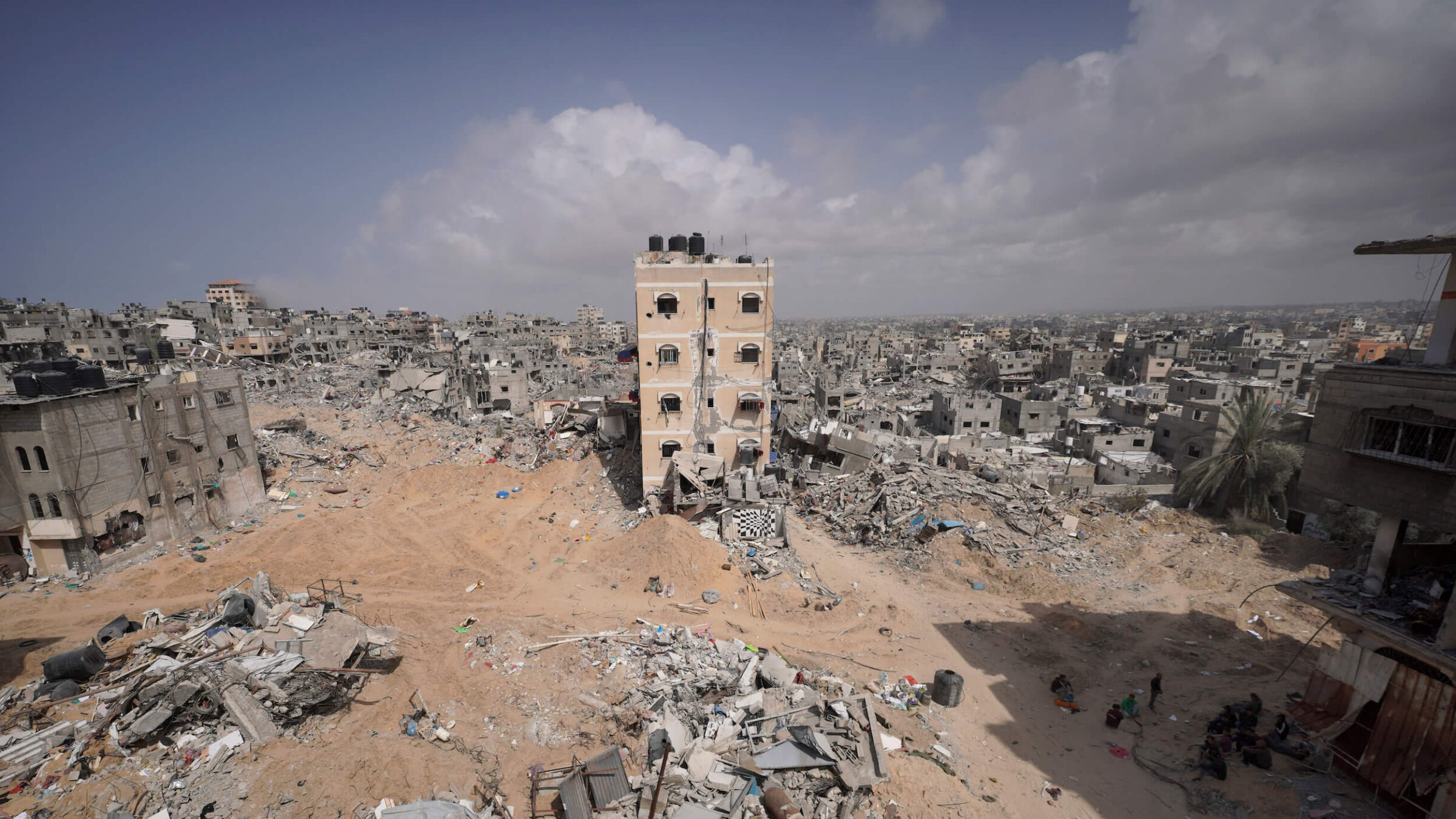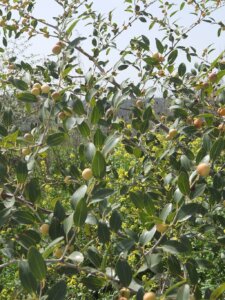She was 7 years old. She shared my name. In Gaza, she died an unthinkable death
Graphic images of Sidra Hassouna’s death sent shockwaves across the internet. To me, they were personal

Palestinians stand amid the rubble of houses destroyed by Israeli bombardment in Gaza. Photo by AFP/Getty Images
I have always cherished my rather unusual name: Sidra. Among the cousins honoring the memory of our late grandfather, Sinai — Shirley, Steve, Sima, Sandra — I always took pleasure in feeling singled out. A few years ago, a Palestinian friend informed me that the Sidra tree grows in the highest plane of Muslim heaven, adding an ecumenical dimension to my personal pride.
Until last month, when a 7-year-old named Sidra Hassouna was killed in Gaza.
In Israel, we are shielded from many of the images of war the rest of the world has been viewing with horror since the Israeli invasion of Gaza that followed the devastating attacks by Hamas on Oct. 7. Our media show us a carefully curated version of the conflict. And because I am not on social media, many days passed before I learned of Hassouna’s unthinkable death; graphic images of her maimed body dangling from a building after an Israeli airstrike on Rafah had swept the internet. Her twin sister, Suzan, her 15-month-old sibling, Malik, and their mother were all wiped out in the blast. Many of the videos feature the gruesome sight of the dead child hanging on a wall, still clinging to her mother’s lifeless hand.
Speaking of the family’s deaths, Husom Zomlot, Palestinian ambassador to the United Kingdom, and one of her relatives, said “every child has a dream.” He is a mild-mannered diplomat in suit and tie who could have been my neighbor or friend. “Had they grown up,” he said, “one of them would have become a teacher, one of them might have been a writer … Israel has taken from us all this potential.”
Sidra Hassouna, 7 - passed away due to Israeli air strike. She was hanging from a building. her legs were blown off.
— Josilynn Gorman 🍉 (she/they/idc) (@tw1nklet1ts) March 2, 2024
1st photo-taken 12 hrs b4 she died.
2nd photo- pencil sketch of Sidra when she was found. I refuse to share the actual photo out of respect 4 her & her family. pic.twitter.com/cdrvG8dikB
More than 11,000 children have so far died in Gaza during the war; in recent weeks, increasing numbers of them have begun to starve to death, with the United Nations warning that resource deprivation means the death toll for children and infants is likely to soon “rapidly increase.” As Zomlot put it: “If these are the new rules, then humanity is doomed.”
The horror of what Sidra Hassouna, her family and all the children of Gaza are experiencing is overwhelming. And yet there are more than 100 hostages still held in Gaza in unspeakable circumstances, with dwindling prospects for survival. And there are the young Israeli soldiers dying nearly every day in the fight to rid Gaza of Hamas. They too might have grown up to become teachers, or writers.
In unpacking Hassouna’s story, I experienced a kind of whiplash. She was one of more than 70 Palestinians who were killed as “collateral damage” in the process of freeing two Israeli hostages, Fernando Simon Marman, 60, and Louis Har, 70, in Rafah in mid-February. The freedom and health of those two hostages is a blessing. But so little acknowledgment is forthcoming from the present government of how great the cost of their liberty is — especially for the young and innocent, like Hassouna.
I want to believe that photos like those documenting the horrifying deaths of the Hassouna family will help build compassion for Palestinians, and help Israelis push our government for change. At a time when political or religious identity has become a source of absolute loyalty or opprobrium, in the streets and on campuses throughout the world, the outpouring of pure human sympathy and outrage over the unspeakable fate of this child offers a kind of cold comfort.
There are small, but growing, pockets of civilian support here for an end to the bombardment of Gaza with its horrific price in Palestinian lives — intrepid souls like the Jewish and Palestinian group Omdim be-yahad, Standing Together, who recently put up posters in Jerusalem with the simple phrase in Hebrew and Arabic: “Only peace will bring security.”

Are there really different chambers of the heart that ache for Shiri Bibas and her little children Ariel and Kfir — aged 4 and 9 months old at the time of their kidnapping — who remain in Gaza, and for Hassouna and all the Palestinian children in Gaza? (Some reports suggest the Bibas family has been killed; Israel has yet to confirm them.) What about Palestinian families in the West Bank, where armed settlers aided by the Israeli army and emboldened by the war in Gaza have ramped up attacks through the months of this endless war?
In Gaza, the West Bank and Israel, for both Jews and Palestinians, it is innocent noncombatants who have paid the ultimate price for the fact that our politicians have not taken the necessary bold steps to end this brutal conflict. The thing about these children, when you see photos of them from before the war, is how ordinary they are, with their colorful sweatshirts, their trusting smiles, their basketballs or jump-ropes. And the hope in their eyes, against all odds.
I can’t quite let her go: Sidra Hassouna, the child who shared my name and died an early and hideous death. A little research discloses that the Sidra tree is indeed located at the apex of the Muslim heaven, Sidrat al-Muntaha, where the Prophet Muhammad had a vision of Allah. One such tree is located in southern Israel, and is estimated to be 2,000 years old; locals believe it is the same tree from which Jesus’ crown of thorns was constructed — creating an interfaith space for quiet fellowship.
If I could believe in any heaven, it would be that place where Sidra Hassouna is at peace under her tree, where children who were never given the chance to grow up reside for all eternity.















